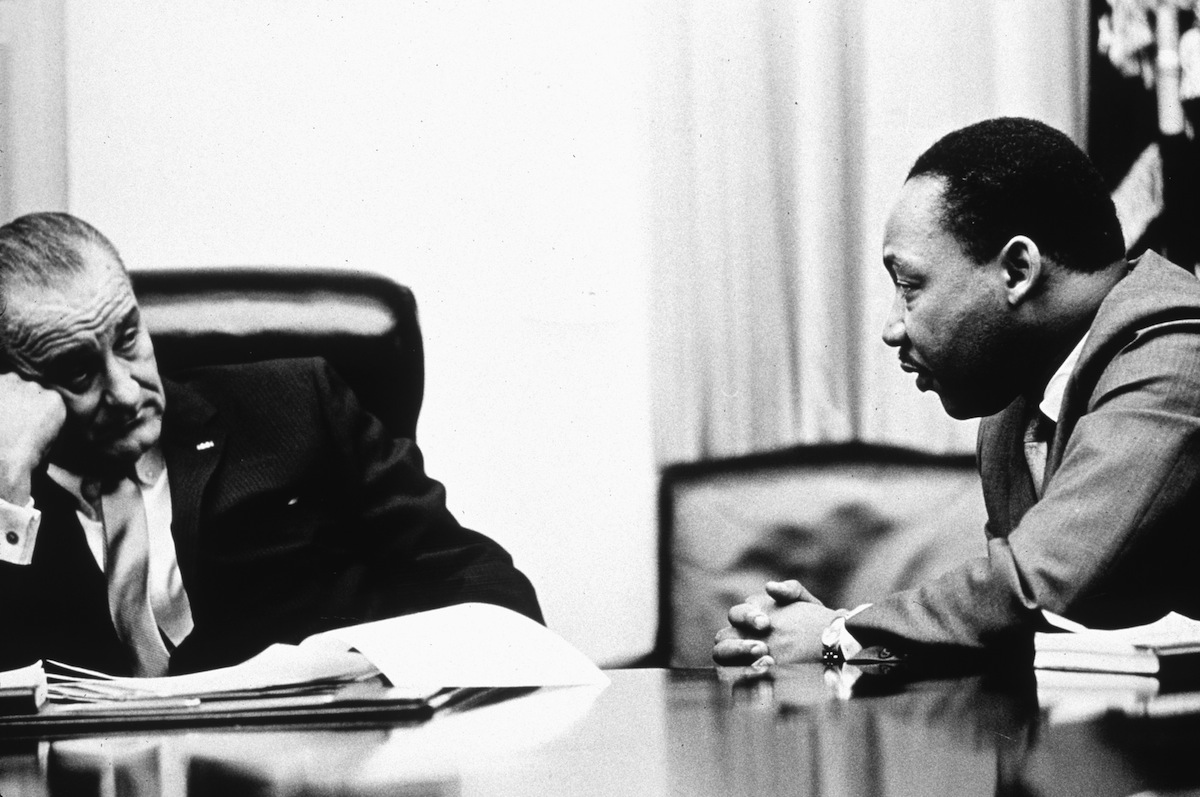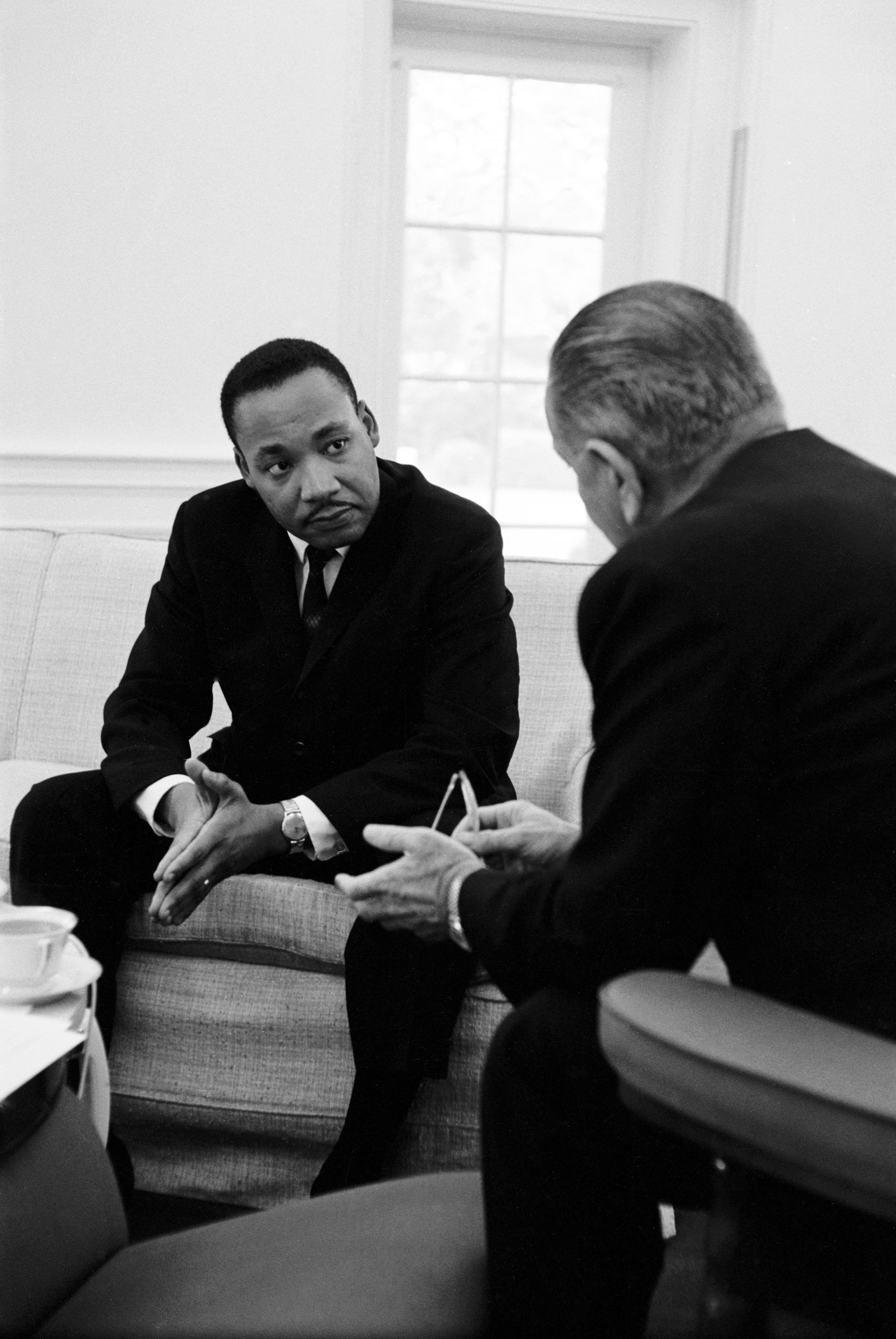
The film Selma—in wide release Jan. 9—tells one of the most dramatic stories in modern American history, of Martin Luther King Jr.’s successful crusade for voting rights in Alabama in 1965. It triggered a smaller drama of its own when former Lyndon Johnson aide Joseph Califano attacked its portrayal of his old boss in the Washington Post. The film is a well-produced and well-acted drama that will draw a lot of Oscar attention. In many respects—but not all—it was well-researched. Some have argued that the inaccuracies are not important to the purpose of the film, or that accuracy is beside the point when it comes to movies that aren’t documentaries. But Califano was right: its portrayal of Lyndon Johnson and his role in the passage of the Voting Rights Act could hardly be more wrong. And this is important not merely for the sake of fidelity to the past, but because of continuing implications for how we see our racial problems and how they could be solved.
Selma suffers as a piece of history, I would guess, because director Ava DuVernay and writer Paul Webb overcompensated for the flaws of movies like Mississippi Burning and Ghosts of Mississippi. Such movies have been justifiably criticized for exaggerating the role of whites compared to blacks in the Civil Rights movement, and for introducing black characters only to have them killed or terrorized. Selma stands this paradigm on its head. With only one exception—federal judge Frank Johnson—the white characters in Selma are either villains (including LBJ, J. Edgar Hoover, George Wallace and Sheriff Clark of Selma), timid wimps, or victims (Unitarian minister James Reeb, who is misidentified at one point as a priest and talks like an Evangelical, and Detroit mother Viola Liuzzo, both of whom were killed by Alabama whites). Crucially, until its last few minutes, the film presents LBJ as the main obstacle to what King is trying to do. There was no shortage of real white villains in the Selma controversy, but LBJ was not one of them. This portrayal depends upon a complete misrepresentation not only of the facts, but also of specific conversations that King and Johnson had during this period.
For example: Selma shows King meeting LBJ in mid-December of 1964 and asking for voting rights legislation. The President is completely negative and highly perturbed, stating that the time has not come to push the issue. But, in reality, though Johnson did say that legislation would have to wait, that wasn’t not the gist of the meeting: Johnson fully recognized the problem and promised to use the legal tools provided by the Civil Rights Act of 1964 to fight it. In fact, two days earlier he had told a New York Times reporter about the possibility of a new law that would allow southern black voters to register at post offices. Then, on Jan. 4, in his State of the Union address, Johnson promised to remove all remaining obstacles to the right to vote. Word soon leaked to the press that the Justice Department was working both on a new constitutional amendment to ban some of the practices southern states used to disenfranchise black Americans, and on legislation that would allow the federal government to register voters. Work on both of those plans preceded apace through January, starting even before King’s Selma campaign had begun. (The most authoritative works on this story are Robert Dallek’s Flawed Giant, David Garrow’s Protest at Selma, and Taylor Branch’s Pillar of Fire.)
Having spent nearly 25 years in Congress, Johnson was acutely sensitive to the issue of legislative timing. A year earlier, after taking office, he had cleverly begun by submitting what looked like a tight fiscal 1965 budget, insisting that total spending be held under $100 billion. That gave him the leverage he needed to get JFK’s tax-cut bill—his other major legislative priority, along with civil rights—through the Congress. Only then did Johnson have the Senate take up the civil rights act, so that the filibuster it was certain to generate would not stop the tax cut and other important matters. In June 1964 the filibuster was overcome, and the Civil Rights Act passed. In 1965, a voting rights bill would probably mean a new filibuster, so Johnson undoubtedly wanted to get at least some of his other major tasks accomplished before it came up. In any case—and this is one of the things I learned studying Johnson’s approach to Vietnam—LBJ never let anyone know what he planned to do until it was absolutely necessary. Because he had gotten the Justice Department going on a voting-rights measure, he knew he would have it ready when he decided he needed it.
King’s Selma protests began on Jan. 14, escalated for the next six weeks, and climaxed on Bloody Sunday, Mar. 7, as Selma shows, on the Edmund Pettus Bridge, where state troopers beat marchers. Meanwhile, King and LBJ continued to talk. On Jan. 15, as Califano pointed out, King and Johnson had a long, cordial phone conversation in which Johnson encouraged King to push for voting-rights legislation. King met with the President in Washington on Feb. 9, and Johnson insisted that King tell the press that the President was going to submit a voting-rights bill. The newspapers not only confirmed this the next day, but also added that the two men had discussed the use of federal registrars, an end to literacy tests and focusing on the most discriminatory areas in the South. They were, in short, agreeing upon the eventual solution to the crisis.
Selma shows LBJ in this period not only refusing to meet any of King’s demands, but also enlisting J. Edgar Hoover to try to discredit and destroy King. Hoover had in fact taken these steps months before, and LBJ had been appalled by them. Like John and Robert Kennedy before him, he was terrified that Hoover would successfully discredit King and set back civil rights for years. Fortunately, because no media outlet would print the salacious material Hoover provided, the FBI Director failed. King himself wrote, in the midst of these events, that while he and Johnson’s approaches to civil rights were far from identical, he had no doubt at all that Johnson was trying to solve the problem of civil rights “with sincerity, realism and, thus far, with wisdom.”
This is not all. LBJ was moving not only out of conviction, but also because events in Selma, even before Bloody Sunday, were arousing northern opinion. Liberal Republicans introduced voting-rights bills of their own in Congress after King’s meeting with LBJ in early February. Mainline churches of all faiths were calling for voting rights too, just as they had lobbied for the 1964 act a year earlier. King and the Selma marchers obviously deserve credit for tapping into broader support for civil rights, but that support had been building for decades. LBJ now knew voting rights could be a winning political issue.
LBJ took no action during February, partly, I suspect, because he was also very busy covertly launching the Vietnam War. (It is typical of this tragic figure in American history that perhaps his best and worst decisions were taken at exactly the same time.) As Selma shows, King met LBJ again on the eve of the planned march to Montgomery that became Bloody Sunday. Johnson did caution King against inflammatory moves in that meeting—though hardly in the tone portrayed in the film—but they also, once again, discussed the details of projected legislation. Within days of Bloody Sunday, Johnson’s press secretary had announced that the President would ask the Congress for legislation in the following week. Selma gives no indication that the speech on Mar. 15, which Johnson concluded with the words, “We shall overcome,” was anything but a complete surprise, and the pacing of the film, I think, implies that the delay between Bloody Sunday and the speech was much longer than eight days. In fact, any newspaper reader knew that the speech only confirmed, in the most dramatic fashion, the direction in which Johnson had been moving for over a month.
The response to Johnson’s speech confirmed that voting rights for all Americans were now supported by an overwhelming consensus. The bill, which abolished literacy tests and sent federal registrars into every southern county with low black registration, passed the House by a vote of 333-85. A Senate filibuster delayed it for 24 days in May, it eventually passed, 77-19. The “aye” votes included the two Democratic Senators from Tennessee. Meanwhile, Medicare, a huge education bill and other measures moved through the Congress as well. Johnson had all he wanted, and more—and the United States has never been the same. Thanks to King and his marchers, support for the new act was too overwhelming for white southerners to delay it and stall other legislation too.
Selma’s distortion of LBJ’s role is important, I think, because it contributes to a popular but mistaken view of how progress in the United States can occur. The civil rights movement won its greatest triumphs in the 1950s and 1960s by working through the system as well as in the streets; by finding allies among white institutions such as labor unions, universities and churches; and by appealing to fundamental American values. Beginning in the late 1960s a very different view began to take hold: that white people were hopelessly infected by racism and that black people could and should depend only on themselves.
Selma contributes to that view. It not only leaves out much of the story of how the Voting Rights Act was passed, but also fails to illuminate how further progress might be made in the future. We still have serious racial problems in this nation. We can only solve them by working together based on shared values. That is what both Martin Luther King Jr. and Lyndon Baines Johnson understood, and that is why they both deserve to be remembered for their enormous achievements today.
David Kaiser, a historian, has taught at Harvard, Carnegie Mellon, Williams College, and the Naval War College. He is the author of seven books, including, most recently, No End Save Victory: How FDR Led the Nation into War. He lives in Watertown, Mass.
MLK and LBJ

More Must-Reads from TIME
- Cybersecurity Experts Are Sounding the Alarm on DOGE
- Meet the 2025 Women of the Year
- The Harsh Truth About Disability Inclusion
- Why Do More Young Adults Have Cancer?
- Colman Domingo Leads With Radical Love
- How to Get Better at Doing Things Alone
- Michelle Zauner Stares Down the Darkness
Contact us at letters@time.com